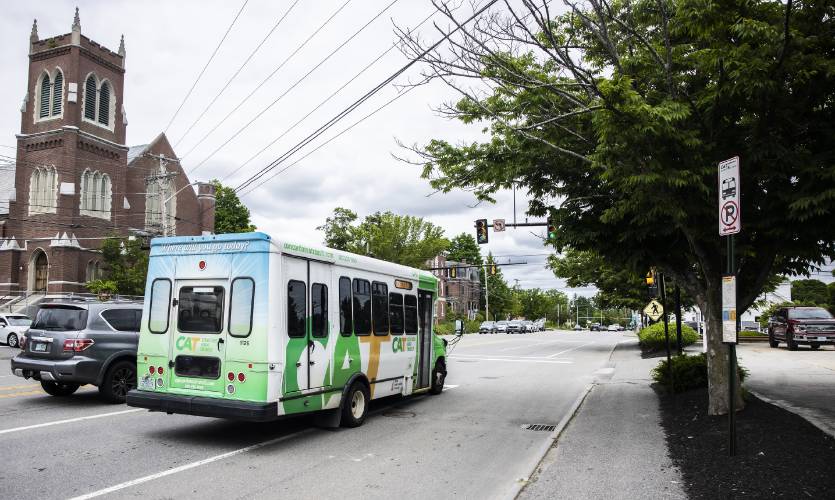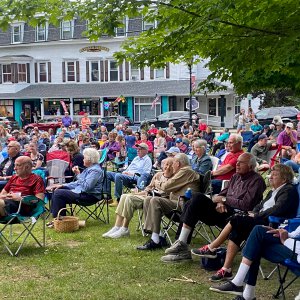North Main Street bus stop will stay put amid competing safety concerns

A Concord city bus drives past the stop on North Main Street in Concord in June. GEOFF FORESTER
|
Published: 09-12-2024 1:54 PM
Modified: 09-13-2024 1:03 PM |
Ian McGregor knows as well as anyone the multitude of reasons people use public transportation.
As a kid, he relied on Milwaukee’s bus system to get around.
“I’m the son of an alcoholic who could not drive,” he told Concord city councilors. “This is kind of a personal issue for me...some of the language that has been used in past discussions about this feels like a personal attack to somebody who does utilize and wants to utilize public transportation within this community.”
City councilors voted in June to move a bus stop on North Main Street after a nearby law firm, Gallagher, Callahan and Gartrell, raised safety concerns about people around the bus stop near its parking lot. This week Council was tasked with selecting an interim placement for the stop while a new permanent one is studied.
When they decided to make the change, several councilors described the law firm’s worries about the stop as emblematic of a growing concern about public safety near downtown.
McGregor and Terri Paige, the director of transportation for the Community Action Program of Belknap and Merrimack Counties, which runs the bus service, made clear on Monday that the current location is, from a traffic standpoint, by far the safest one. Both are members of the city transportation policy committee.
They urged councilors that, if they must move the stop, to keep it where it is until the city can create a proper one.
Leaving Mayor Byron Champlin and some of the longer-serving councilors in the minority, the council’s newest members voted in a bloc with others to pump the brakes on both the law firm’s request and the descriptions of downtown public safety underpinning it.
Article continues after...
Yesterday's Most Read Articles
 New England College expands $10,000-per-year offer to Concord, Bishop Brady graduates
New England College expands $10,000-per-year offer to Concord, Bishop Brady graduates
 ‘There’s tradition up here’ – Morrill Farm approaches its centennial, celebrates evolution and growth
‘There’s tradition up here’ – Morrill Farm approaches its centennial, celebrates evolution and growth
 AROUND CONCORD: Your guide to free summer music
AROUND CONCORD: Your guide to free summer music
 ‘Life long friends’: Three women worked together to welcome visitors to East Concord
‘Life long friends’: Three women worked together to welcome visitors to East Concord
 New Hampshire home prices hit an all-time record high amid housing shortage
New Hampshire home prices hit an all-time record high amid housing shortage
 Truck collision on South Main Street in Concord diverts traffic
Truck collision on South Main Street in Concord diverts traffic
“The notion that somehow bus riders correlate to any public safety concern,” Councilor Kris Schultz said, “I bristle at that.”
Ari Pollack, an attorney at the Gallagher, Callahan and Gartrell law firm, asked the council to consider moving the bus stop away from its North Main Street offices earlier this year, citing public safety concerns related to people gathering near the stop and traffic risks between those waiting for the bus and cars pulling in and out of the firm’s parking lot.
At the vote in June, Councilor Fred Keach and others framed the stop as a “magnet” for problems in the downtown area with criminal activity by people experiencing homelessness.
He defended that concern Monday night.
“It happens that the bus stop is a gathering point for not only bus riders but other folks in the population that have other intentions that are criminal,” Keach said. He felt obligated to give a prompt response to Pollack’s ask. “The timeline to find a permanent solution is two years away. That’s unacceptable for me.”
Outside the meeting, Paige and McGregor framed the effort to move the stop at all as misdirected.
“The threat was perceived as coming from people on the bus, and the reality is, that’s never really been connected,” Paige said.
Whether it was a genuine traffic risk or perceptions of crime, “moving the bus stop wouldn’t solve any of those things,” McGregor said. “Other measures could be taken to could be taken to address the threat that people feel at that place of business. Moving it just makes other people deal with that.”
The proposed temporary placement of the stop, just a few dozen feet south of the current one would be less safe from a traffic standpoint, McGregor and Paige said.
The interim spot would mean the bus would hang out into the travel lane while at the stop, would not be able to deploy its accessibility features for those boarding and exiting, and would eliminate five street parking spaces. The relocation, was also not endorsed by Pollack, who said the firm favored a place further south down the road.
Paige told the council she’d be reluctant to use a temporary stop that she felt was unsafe. Bus accidents not only put people in harm’s way but mean taking vehicles out of service. If she felt she had to close the North Main stop, the the bus line would have a more than mile-long stretch without a stop.
“I don’t want to have to put people in that position,” she said. “But it feels like it would be a precedent I don’t want to set in terms of backtracking on safety.”
Councilor Ali Sekou noted that his wife used the bus to get to work when she first moved to Concord. He worried about what one less stop might mean for working people relying on the bus to commute.
“I’m just trying to see the impact that would make to please one person,” he said, “to put the entire community at risk of losing a stop.”
The North Main Street bus stop is part of Concord Area Transit, a free service run by the Community Action Program that has expanded its popularity post-pandemic. It sits along the system’s Penacook line, which stretches from Penacook Village down through downtown to Concord Hospital, and Crosstown line, which winds through the city from the District Courthouse toward the airport. For each of those routes, one bus arrives per hour. Like most of the stops, the only feature to identify it as a pickup location is a small, white road sign.
Paige and the city created the stop in question a few years ago, she reminded councilors, and they picked it for several reasons. At that spot, just south of the Washington Street intersection, the traffic light makes it easier for pedestrians to reach the bus and for the bus to re-enter traffic. The bus can pull fully onto the shoulder of the road and if needed it can deploy accessibility features to ensure everyone can board. It is equidistant from the other two stops on that line. No other place on that road checks all those boxes, Paige and McGregor explained.
The risk of losing a stop, or creating a less safe one, was too great for most councilors, who voted 8-4 over the mayor, Keach and others to keep the stop where it is for the time being while the city gathers community input and research into where a new stop should go. The debate and resulting vote was a vocal showing by new councilors and one of few times they’ve stepped forward together to override more established members of the body.
Catherine McLaughlin can be reached at cmclaughlin@cmonitor.com







 Canterbury honors ‘real heroes’ with updated Military Veterans’ Project
Canterbury honors ‘real heroes’ with updated Military Veterans’ Project Look, up in the sky! It’s… an Airstream trailer?
Look, up in the sky! It’s… an Airstream trailer? Around Concord: Over The Moon Farmstead brings mead, beer, pizza and music to Pittsfield
Around Concord: Over The Moon Farmstead brings mead, beer, pizza and music to Pittsfield Around Concord: The Balshaws bring a rustic revival to the Canterbury Country Store
Around Concord: The Balshaws bring a rustic revival to the Canterbury Country Store
